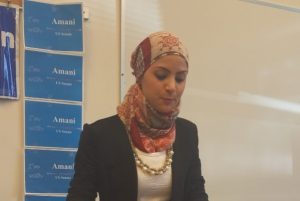-
What We Do
- WHERE WE WORK
-
About Us
 Welcome Message from Carol Jenkins
Welcome Message from Carol JenkinsFor more than 90 years, World Learning has equipped individuals and institutions to address the world’s most pressing problems. We believe that, working together with our partners, we can change this world for the better.
On my travels, I’ve had the opportunity to meet with many of those who have joined us in this mission. In Baghdad, we’ve trained more than 2,300 Iraqi youth who are already giving back at home. In London, our partners in the TAAP Initiative strongly believe that we are all responsible to practice inclusion. And in Vermont, our Experiment in International Living and School for International Training participants prove every day that they have the tools and the determination to change the world.
Please join us in our pursuit of a more peaceful and just world.
- Get Involved
Media Center > Story
Unemployment Rises in the West Bank
August 29, 2017
Unemployment is a growing concern among youth in the West Bank, and Amani Aruri is working hard to close the gap, especially for women and new graduates.
Aruri is a project manager at the Arab Americare Foundation, a U.S.-based NGO that seeks to advance the professional and economic well-being of young professionals in the West Bank. Recently, she participated in the Leaders for Democracy Fellowship (LDF), an exchange program run by the non-profit World Learning, and funded by the U.S. Department of State, that brings leaders from the Middle East and North Africa (MENA region) to the U.S. for leadership training.
Aruri wanted to learn more about U.S. culture and meet other professionals who could help create projects in the West Bank.
According to the World Bank, unemployment rates reached 27% in 2016 despite the Government of Israel’s efforts to increase the number of work permits for Palestinians. At 42%, unemployment rates are even higher in Gaza, and more than half of all youth — 58 percent — are unemployed.
“We suffer from a lack of opportunities,” says Aruri. “We suffer from a tough economic situation which makes graduates more desperate for jobs.”
Aruri says it is particularly tough for women to find work.
“When it comes to women’s issues we have a big obstacle, which is the social perception about women and their potential. I hope that women will be able to believe in themselves and know that they can achieve more,” she says.
 Aruri explains that the current political climate makes it difficult for communities in the West Bank to thrive and grow to their full potential.
Aruri explains that the current political climate makes it difficult for communities in the West Bank to thrive and grow to their full potential.
“We face daily challenges and obstacles because we suffer from the Israeli occupation which restricts our daily movement, which also restricts our initiatives. We can’t implement any initiatives that we may be thinking about. We are restricted economically, professionally and in daily life.”
She says the fellowship was an excellent opportunity to learn about how other countries in the MENA region deal with troubling political issues, and it made her feel less isolated.
“I’m from the [West Bank], but I didn’t have a full understanding of what’s going on in Kurdistan, what’s going on in Algeria or Tunisia or Morocco. Spending over three months with these fellows gave me the chance to discuss these issues with them,” says Aruri.
Aruri says it was also a great opportunity to talk about her community with a global audience.
“This program also gave me the opportunity to serve as an ambassador for…youth and it gave me the opportunity to tell others what’s going on there,” she says.
While she was in Washington, DC, Aruri interned at the Center for International Private Enterprise (CIPE), which seeks to strengthen democracy around the globe through private enterprise and market-oriented reform.
As a result of her internship, Aruri is partnering with CIPE to create a toolkit to enable women in the West Bank to gain better access to the local labor market.





